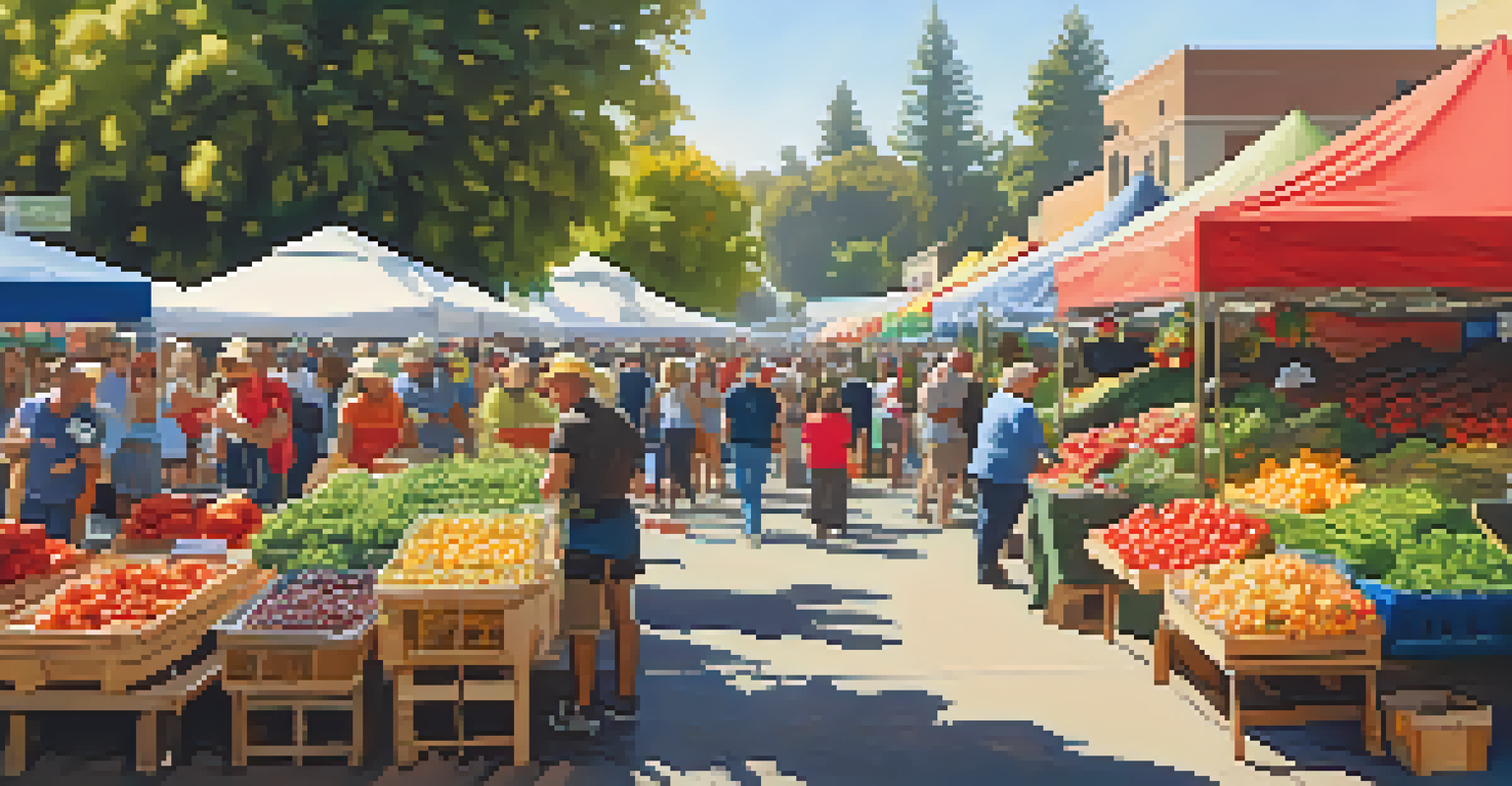Sacramento's Fertile Valleys: The Backbone of Local Economy

Understanding Sacramento's Unique Agricultural Landscape
Sacramento is often referred to as the 'Farm-to-Fork Capital of the World' due to its rich agricultural heritage. The region's fertile valleys, particularly the Sacramento Valley, provide an ideal environment for diverse crops, thanks to its nutrient-rich soil and favorable climate. This agricultural abundance not only sustains local farms but also supports a vibrant local economy that thrives on fresh produce.
Agriculture is the most healthful, most useful, and most noble employment of man.
The geographical features of Sacramento, including its proximity to waterways like the Sacramento River, further enhance its agricultural potential. These natural resources ensure that farmers have access to irrigation, which is crucial for growing high-quality crops. Additionally, the blend of urban and rural settings creates a unique synergy that fosters community engagement and support for local agricultural initiatives.
Moreover, the agricultural sector in Sacramento is not just about farming; it's deeply intertwined with local businesses, restaurants, and markets. This interconnected ecosystem allows for a sustainable approach to food production and consumption, promoting a healthier lifestyle for residents while bolstering the local economy.
Key Crops and Their Economic Impact
The fertile valleys of Sacramento are home to a variety of crops such as rice, almonds, tomatoes, and grapes, which play a significant role in the local economy. Rice farming, in particular, has flourished in the Sacramento Valley, making California one of the top rice-producing states in the country. This success not only contributes to the local economy but also positions Sacramento as a key player in the national and global agricultural markets.

Almonds are another powerhouse crop in the region, with California producing approximately 80% of the world's almonds. This lucrative industry has led to the creation of numerous jobs, from farming to processing and distribution, directly benefiting the local workforce. The economic ripple effect extends to various sectors, including transportation, retail, and hospitality, all relying on the success of these crops.
Sacramento's Agricultural Abundance
Sacramento's fertile valleys support a variety of crops, significantly contributing to the local economy.
Additionally, the cultivation of grapes has established Sacramento as a notable wine-producing region. Wineries and vineyards not only attract tourism but also contribute significantly to the local economy through wine sales and events. This agricultural diversity underpins Sacramento's economic stability and growth, making it a vital component of the region's overall prosperity.
The Role of Local Farmers in Economic Sustainability
Local farmers are the backbone of Sacramento's agricultural economy, and their commitment to sustainable practices is crucial for long-term viability. By adopting methods such as crop rotation, organic farming, and water conservation, farmers are not only enhancing soil health but also ensuring that their operations remain profitable. This focus on sustainability aligns with the growing consumer demand for environmentally friendly products.
The farmer has to be an optimist or he wouldn’t still be a farmer.
Furthermore, local farmers markets play an essential role in connecting producers with consumers, fostering a sense of community and support for local agriculture. These markets not only provide fresh, seasonal produce but also contribute to the local economy by keeping dollars within the community. By purchasing directly from farmers, consumers help sustain local jobs and promote economic resilience.
In addition to direct sales, many farmers are engaging in agritourism, allowing visitors to experience farm life firsthand. This innovative approach not only provides an additional revenue stream for farmers but also educates the public about the importance of agriculture in the local economy. Such initiatives highlight the invaluable role that local farmers play in both economic sustainability and community engagement.
Challenges Facing Sacramento's Agricultural Sector
Despite its many advantages, Sacramento's agricultural sector faces several challenges that could impact its future viability. Climate change is a significant concern, as changing weather patterns can affect crop yields and water availability. Farmers are increasingly grappling with unpredictable rainfall, rising temperatures, and prolonged droughts, which threaten their livelihoods and the local economy.
Furthermore, urban expansion poses a challenge to agricultural land preservation. As Sacramento continues to grow, farmland is often converted into residential or commercial developments, reducing the area available for farming. This loss of farmland not only impacts local food production but also disrupts the economic balance between urban and rural communities.
Challenges Threatening Farmers
Climate change, urban expansion, and global competition pose significant challenges to Sacramento's agricultural sector.
Finally, competition from global markets can put added pressure on local farmers. With imported goods often being cheaper, it can be challenging for Sacramento's farmers to compete on price while maintaining high-quality standards. Addressing these challenges requires collaboration between farmers, policymakers, and the community to ensure a sustainable future for the region's agriculture.
Innovations in Agriculture and Technology
Innovation is key to overcoming challenges in Sacramento's agricultural sector, and technology plays a vital role in this transformation. Precision agriculture, for instance, leverages data and technology to optimize farming practices, enhancing efficiency and reducing waste. By utilizing sensors and drones, farmers can monitor crop health and soil conditions, making informed decisions that boost productivity.
Moreover, advancements in irrigation technology, such as drip irrigation systems, help farmers conserve water while ensuring their crops receive adequate hydration. As water scarcity becomes a growing concern, these innovations are crucial for maintaining agricultural viability in the region. Such technologies not only support farmers but also contribute to the overall sustainability of Sacramento's agricultural economy.
Furthermore, local initiatives promoting research and development in agriculture are paving the way for new practices and crops. Universities and agricultural organizations are collaborating to explore innovative solutions that address challenges like pests, diseases, and climate change. This commitment to innovation ensures that Sacramento's fertile valleys will continue to thrive in a rapidly changing world.
Community Support and Local Initiatives
The strength of Sacramento's agricultural economy is deeply rooted in community support and local initiatives that prioritize locally grown produce. Organizations such as the Sacramento Food Bank and Family Services work tirelessly to connect local farmers with those in need, ensuring that fresh food is accessible to all. This collaboration not only helps alleviate food insecurity but also reinforces the importance of supporting local agriculture.
Additionally, educational programs aimed at promoting agricultural awareness are gaining momentum in the community. Schools and non-profits are partnering to teach children about farming, nutrition, and the importance of local food systems. By instilling these values in the next generation, Sacramento is fostering a culture that appreciates and supports its agricultural heritage.
Innovation Drives Sustainability
Technological advancements and local initiatives are essential for enhancing productivity and ensuring the sustainability of Sacramento's agriculture.
Community events, such as harvest festivals and farm tours, also play a vital role in celebrating local agriculture. These gatherings provide a platform for farmers to showcase their products and connect with consumers, creating a sense of camaraderie and shared purpose. As residents come together to celebrate their local farmers, they reinforce the vital connection between agriculture and the local economy.
The Future of Sacramento's Agricultural Economy
Looking ahead, the future of Sacramento's agricultural economy appears promising, especially with the increasing emphasis on sustainability and local food systems. As consumers become more aware of the benefits of eating locally, the demand for fresh produce from Sacramento's fertile valleys is expected to grow. This trend bodes well for local farmers and businesses, creating new opportunities for economic growth.
Moreover, ongoing support from local government and community organizations will be crucial in addressing the challenges facing the agricultural sector. Policies that prioritize farmland preservation, water conservation, and sustainable practices will help ensure that Sacramento's agriculture remains resilient in the face of adversity. Collaborative efforts will be key to shaping a thriving agricultural landscape for generations to come.

Finally, as technology continues to evolve, Sacramento's farmers will have access to innovative tools and resources that can enhance productivity and sustainability. By embracing these advancements while maintaining a strong connection to their community, Sacramento's agricultural sector is well-positioned to thrive, making it an integral part of the region's economic future.